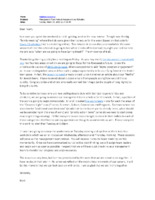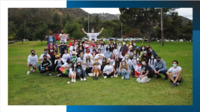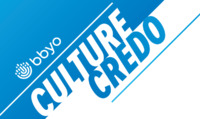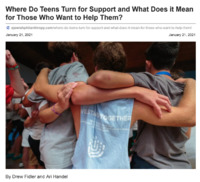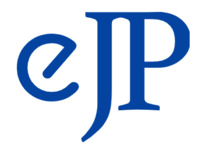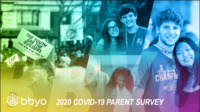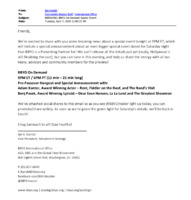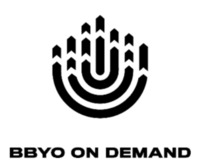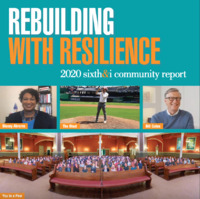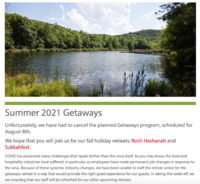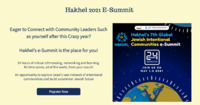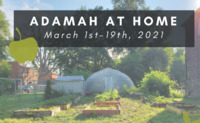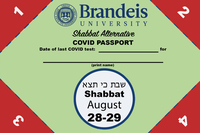Items
Item set
American Jewish Life
-
BBYO: Wellness and Inclusion Advisory Council events
Flyer for two events for BBYO parents to attend. The events are focused on preparing parents for a post-pandemic world when teens return to school and normalcy. -
Management Team Retreat Assignment and Schedule
The email was sent to the BBYO administration team shortly after going into quarantine in March 2020. The email thanked the team for their cooperation and informs them on next steps. Instructions were given to complete worksheets on five different areas and what they should consider for the future. -
BBYO: June 1st All Staff Call
A series of pictures from events that BBYO held both in-person and virtually. A few of the slides include positive comments from parents of teens who attended events. Some pictures are of Zoom calls with fun backgrounds and masked teens playing games outside. -
BBYO: Culture Credo
A flyer of BBYO's values and mission as a Jewish organization that is there to serve Jewish teens. The values are what drive BBYO and remind its members that the organization is meant for them and it a fun and safe space. -
Where Do Teens Turn for Support and What Does it Mean for Those Who Want to Help Them?
The article talks about the results of a survey that BBYO conducted on its teen audience and members in order to gauge mental health needs during the pandemic. BBYO used the survey's results as well as mental health resources to focus on three areas: teen training on wellness, establish wellness support teams, and review of BBYO's internal practices in wellness. -
When is the Right Time to Return to In-Person Programming
The article, written by Vice President of IT Strategy and Measurement at BBYO, Karen Alpert, summarizes the main takeaways from a 2020 BBYO survey sent to parents of members. The survey focused on questions regarding parents' opinions on resumption of in-person programming, on BBYO's response to the pandemic, and the financial impact on families. -
BBYO: 2020 COVID-19 Parent Survey
The results to a survey sent out to parents of BBYO members across the country show that overall (72%), parents are not comfortable with in-person programming. The survey also asked questions regarding opinions on BBYO's response to the COVID-19 pandemic and the financial impact that the pandemic has on Jewish families with teens. -
BBYO: Chapter and Community Program Ideas
BBYO offers a list of ideas for its chapters to engage members whether online, in person, or both. The list includes projects and activities for both large communities and small chapters to undertake. The document makes sure to list activities that can be conducted through Zoom or hybrid options as well. -
BBYO On Demand Special Event
Email notifying BBYO community of special event happening with actor Adam Kantor and lyricist Benj Pasek. The event will include a special announcement in which the guests will announce to those watching on the platform. The document contains details of the event as well as encouragement to share the event on social media. -
BBYO On Demand
BBYO digital platform that hosts events to connect Jewish teens around the world. Events and conferences focus on themes of leadership. The page regularly updates the programs that BBYO is offering virtually for teens. -
Information on BBYO On Demand
This flyer provides information on BBYO's digital space created in the wake of the COVID-19 pandemic. The document highlights some events that were hosted on the platform. -
BBYO COVID-19 Advisor Update
The text highlights "BBYO On Demand", a digital space created in the wake of the pandemic in order to connect Jewish teens to activities and events held by BBYO. The document outlines different roles BBYO advisors can take within the space, such as a "content creator" and a "content facilitator". -
Jewish Law and Ethics: a hackathon for the age of COVID-19
The human rights organization, T'ruah, challenged eight Jewish scholars to find answers to four ethical questions brought on by the COVID-19 pandemic. The scholars were asked to source materials on Jewish law and ethical practice to find ways to navigate these ethical problems which include questions of evication and worker's rights. -
Hebrew College's response to coronavirus
Hebrew College updates its students and staff on an updated policy in response to the Delta Variant of COVID-19. As of August 20, 2021, all students, staff, faculty, renters, and visitors are required to wear masks when in the building regardless of vaccination status. Additionally, all students and faculty must also show proof of vaccination. -
Sixth & I Community Impact Report
This report captures the challenges and triumphs of trying to fulfill Sixth & I's mission during a pandemic and illustrates how community support and participation made it all possible. -
Is This Passover Really Different
Rabbi Yehuda Ceitlin Is this Passover Really Different? This Passover, Jews around the world are asking the question, "Why is this Passover different from all others?". Some humorously reply, "Don't ask." In Israel, there are advertisements that respond less whimsically, instructing, "This year we all stay home." This year, instead of gathering with our loving grandparents, we are told to love them "from a safe distance." This year, instead of celebrating with all friends and family, we are told to stay within our own households. This year, instead of getting out and having fun over the middle days of the holiday, we are told to skip the leisure trips and leave off visiting parks. The "Stay Home - Stay Alive" rule will be practiced by Jewish people in the U.S. and around the world, as the global pandemic continues to threaten our health and our lives. But is this night really different? If we look back at the very first Passover, this description may sound very similar. On that fateful night, the 15th of Nissan, 3332 years ago, our people were instructed to remain in their homes in isolation for their safety. Outside, there was a raging plague killing people. And that is how the tradition of Passover began. G-d passed-over the Jewish homes during the 10th and final plaque, punishing the Egyptians for decades of enslaving, torturing and killing the Jews. Passover is called the Festival of our Freedom, but in reality, it is the ultimate celebration of faith. It is the story of how our people remained optimistic when the future seemed hopeless and trusted in G-d even when they felt He had forsaken them. And though G-d has not spared the Jews from this COVID-19, nor has He told us why humanity is being assaulted with these devastating blows, He is the one behind this wheel as He is behind all others. Our faith brought us salvation during the first Passover in isolation and we pray that it brings salvation to the world during our upcoming Passover in isolation. -
A Passover Prayer
Rabbi Robert Eisen of Congregation Anshei Israel (now retired) discusses what prayers are needed to escape the "Egypt" of the pandemic. A PASSOVER PRAYER Depending upon the final publishing schedule, this piece will appear either immediately before we conclude our observance of Passover, or immediately after. And, though we might feel different about ourselves and this world we find ourselves living in before or after the end of our festival observance, I would venture to guess that we will all share one thing in common: a prayer that this year our prayers really will be answered! True, the “Egypt” that we are experiencing is different from that of our ancestors. Yet, that we have been “groaning,” “crying out for help,” “moaning,” each in our own way, and collectively, cannot be denied. We find ourselves in a place of “narrowness” (a word that is similar to a core meaning which can be derived from the Hebrew: MITZRAYIM - Egypt) ... a place where we have been, in some ways, cut off from those, and that, which mean the most to us. And, as we read in the HAGGADAH, we want only to be brought out from this slavery to freedom, from this despair to joy, from this mourning to celebration, from this darkness to light, from this enslavement to redemption so that we can sing before God a new song: HALLELUYAH. What will it take? How will we get there? Social distancing and following the guidelines of the CDC is a start … and absolutely necessary. However, in order to get through this we need to do one more thing: we need to embrace it for what it is … with a prayer. As God prepared to take our ancestors out of Egypt, as a prelude to the 10th plague (the killing of the first-born), the people were told to put blood on their doorposts. Why? Was the Angel of Death that “challenged” that he had to look and see if the house was of the Hebrews or not? NO! The people were directed to place the blood on the doorposts to teach them that they would be saved only to the extent that they participated in that process … in order to be redeemed, they needed to work to redeem themselves. What does that take? What is the equivalent for our day? To start: A prayer … a recognition that there is that which is greater than us (individually and/or collectively), and that there will be a time after this when we will be able to live life to the fullest once again. A prayer … that we will find the strength to reach out to others the way we expect God to be reaching out to us. A prayer … that we will continue to see beyond the present moment. A prayer … that we will have the hope and the faith to remember that better days do lie ahead. Will we ever return to what we used to have as normal? Other than trying not to take some things that we used to for granted I do believe that we will. For our ancestors the wilderness was at times as trying as Egypt, but they continued to step forward because they knew there was a Promised Land. Let us pray that we can and will do the same. Stay safe … Stay well … B’VIRKAT SHALOM -
Love Your Neighbor in 8 Easy Steps
Rabbi Israel Becker of Congregation Chofetz Chayim in Tucson, Arizona, explores why the sage Hillel changed the connotation of "love your neighbor" from a positive action to "That which is hated to you, do not do to your friend." Love Your Neighbor in 8 Easy Steps There is a famous story in the Talmud about how someone asked the great sage Hillel to teach him the whole Torah while standing on one foot. The Maharsha commentary (Rabbi Shmuel Eidels, 1555-1631) explains that the question was not facetious. The questioner wanted to know if there is one fundamental principle that connects to the entire Torah. Hillel responded, "That which is hated to you, do not do to your friend." The Talmud commentaries explain that Hillel was referring to the Torah commandment "Love your neighbor as yourself" (Leviticus 19:18). The centrality of love your neighbor was echoed several generations later by Rabbi Akiva, who taught that love your neighbor is a major principle that permeates the entire Torah. The obvious question that many commentators ask is, "Why did Hillel change the explicit connotation of the verse, which was presented with the positive (to actively love)?" Rabbi Dovid Tzvi Hoffman (1843-1921) explains that Hillel is actually presenting to us a tangible way to fulfill the mitzvah of love your neighbor. Hillel reveals to us that the commandment of generating love is not one of quantity, but one of quality. If you could measure the amount of love a person generates for himself, the normal human will certainly love himself more than his neighbor. For example, when a person looks at a group photo, the first person they notice is themselves. Are most human beings violating, then, love your neighbor as yourself? G-d is asking us to strive to generate more and more love for our neighbor. But He does not expect us to go beyond the scope of what a human is capable of. What G-d demands of us is to provide the same quality of human interaction that we would want for ourselves. Hillel is also teaching us that love your neighbor is not an abstract emotion. Love your neighbor is fulfilled by translating the emotion into concrete action. Rabbi Yaakov Tzvi Mecklenburg (1785-1865), in his famous Haketav VehaKabbalah, provides eight steps to fulfill love your neighbor as yourself. He explains that “as yourself” teaches not that we are obligated to give everything we have to the next person, because that is not what we expect the next person to give to us. Love as yourself means to do to him what you would want to be done to yourself, and not to do to him what you would not want to be done to yourself. Rabbi Mecklenburg gives eight concrete very human examples of how to love your neighbor: 1. Be truthful. 2. Treat him with dignity. 3. Ask how he is faring. 4. Respond to his pain. 5. Greet him in a friendly way. 6. Judge him favorably (by giving him the benefit of the doubt). 7. Extend yourself when he asks for a small favor. 8. Let him borrow from you something that he needs. Hillel's response to the questioner, which is recorded in the Talmud for all time, actually provides for us a tangible way to perform a mitzvah that we might feel is otherwise beyond our reachable ability, attainable only to a few select super-holy individuals and not something that every single one of us can apply constantly. These steps may seem small and trivial, but Hillel is teaching us that small steps enhance G-d's world in a powerful way. -
Empathy in a Time of Pandemic
Reflection by Rabbi Helen Cohn of Congregation M'kor Hayim in Tucson on the challenge of practicing empathy, of the Mussar middot, during the pandemic. Empathy in a time of Pandemic Mussar is the Jewish practice of character refinement, based on working with specific traits called middot (sing., middah). Our congregation has two Mussar groups who work with a middah for two weeks at a time. Last December we created the list of middot for 2020, months before COVID-19. However, each trait during the past several months has been surprisingly fitting for our unique situation, including the current middah, Empathy. The English words Empathy and Compassion are often defined slightly differently. Empathy means sympathetically feeling oneself in another’s position; Compassion means doing something specific because of a feeling of empathy. As we huddle in place, our ability to act in an empathic way is greatly limited. Yes, we are touched and inspired by acts of generosity and kindness that we hear about, and the actions that some of us do here in our own community. But we also personally feel our many constraints. Our Jewish texts offer guidance for caring for someone who is ill. This is one of my favorite examples: One of the students of Rabbi Akiva became ill. The Sages did not visit him, so Rabbi Akiva visited him. He swept and cleaned the floor, and the student recovered. The student said, “My teacher, you revived me.” Rabbi Akiva then taught: anyone who does not visit the ill, it is as if that person is spilling blood. (B. Talmud, Nedarim 40b) Interpretation: it could be the sick person has no one caring for him, and if he has no visitors, no one will know his situation and therefore no one will come to his aid. But our situation is exactly the opposite: we cannot (under most circumstances) visit the ill. We cannot even visit a person who needs consolation because of fear, anxiety, or being in a period of mourning. What, then, can we do? How can Empathy guide our behavior? We might ask: What do we want from others, as we isolate in our own homes? Perhaps looking with empathy at our own situation we will be guided to see what we can do for others. -
Summer 2021 Getaways: Isabella Freedman Jewish Retreat Center
Unfortunately, we have had to cancel the planned Getaways program, scheduled for August 8th. We hope that you will join us for our fall holiday retreats: Rosh Hashanah and Sukkahfest. COVID has presented many challenges that ripple farther than the virus itself. As you may know, the food and hospitality industries have suffered, in particular, as employees have made permanent job changes in response to the virus. Because of these systemic industry changes, we have been unable to staff the retreat center for the getaways retreat in a way that would provide the right guest experience for our guests. In taking this week off, we are ensuring that our staff will be refreshed for our other upcoming retreats. -
COVID-19 Communicable Disease Policy (CDP): Isabella Freedman Jewish Retreat Center
Introduction This document sets forth the policies of the Isabella Freedman Jewish Retreat Center (“Isabella Freedman”) for complying with the Connecticut State Reopening Rules. The policies in this document are in effect as of March 19th, 2021 and reflect all the current Connecticut state guidelines and Hazon/Isabella Freedman’s policies for reopening. Hazon will continue to monitor developments surrounding COVID-19 in Connecticut and make adjustments as appropriate, including for any changes in legal guidance. All references to “guests” in this CDP shall include participants in the “Isabella Freedman Getaways” program, participants in the Adamah Fellowship and individuals, families and groups that rent accommodations at Isabella Freedman. All references to “employees” in this CDP shall include all part-time and full-time employees of Hazon, as well as volunteers and independent contractors who are working at Isabella Freedman. General Polices Screening for COVID-19 All individuals arriving at the retreat center for the first time will undergo COVID-19 screening as part of the check-in/orientation process, which will take place before these individuals are permitted to access their residence. This screening will be administered by the Retreat Manager on duty. This screening will involve: Temperature Checks Questionnaires regarding recent COVID-19 symptoms or exposure to COVID-19. The questionnaire will, at a minimum, ask whether, within the preceding 14 days, the individual or any of his or her co-habitants have: exhibited any COVID-19 symptoms; or been exposed to confirmed or presumed cases of COVID-19. PLEASE NOTE that individuals who demonstrate symptoms of COVID-19, who were recently exposed to confirmed or presumed cases of COVID-19, or who recently traveled to active COVID-19 hot spots will not be permitted to stay at Isabella Freedman until they complete a 14-day quarantine following the instance of symptoms or exposure. Each guest, including children must affirm that they have either a negative COVID-19 test within 72 hours of arrival, a COVID-19 vaccine completed at least two weeks before arrival, or recovered from COVID-19 within three months of arrival. If you have had only 1 shot of a vaccine you are still required to get tested. These guidelines have been recommended by the CDC and our consulting medical professionals. Throughout their time at Isabella Freedman, employees and guests are expected to self-monitor for symptoms of COVID-19. In the event that an employee or guest suspects that he/she/they may be exhibiting symptoms of COVID-19, this individual should report immediately to their supervisor or the Retreat Manager on duty, respectively. Social Distancing and Hygiene Employees and guests are required to spread out to maintain appropriate social distancing (i.e., a minimum of 6 feet of space between individuals who are not in the same group) at all times while at Isabella Freedman, including while performing tasks or participating in activities. This requirement should be followed at all times, but is especially important in indoor spaces. For the purposes of social distancing, being in a “group” applies only to guests who are sharing a residence at Isabella Freedman. Employees are never considered to be in a group, and are required to maintain a minimum of 6 feet of distance between themselves and all other people, including other employees who perform the same tasks or work in the same designated area, whenever possible. Employees and guests are required to wear masks at all times when they are indoors and outdoors, less than 6’ of distance in the company of other individuals who are not in their group. This requirement applies regardless of whether social distancing is also being observed. Guests can remove their masks while eating in indoor dining areas, but only when seated at their table and only during the course of eating. No guest or employee is required to wear a mask if doing so would be contrary to his or her safety because of a medical condition. Such guests and employees are encouraged to discuss alternative arrangements with Isabella Freedman to help ensure their safety while on campus. All used disposable masks should be disposed of immediately following use by employees. Employees using reusable masks, such as cloth masks, should wash them properly (i.e. based on CDC guidance for washing close face coverings) and daily. Isabella Freedman will supply all of its employees with appropriate Personal Protective Equipment (“PPE”), including masks, required for the performance of their job duties. Guests are required to bring a sufficient amount of PPE, including multiple masks and/or appropriate face coverings, to cover their entire stay at Isabella Freedman. Employees and guests should be conscious to avoid touching their masks and/or faces at all times. Employees and guests should wash their hands properly (i.e., in accordance with CDC guidelines, which require hand washing to take at least 20 seconds) and frequently. Handwashing and/or hand sanitizer stations will be placed throughout the retreat center, including in the following locations: Near and around all dining service areas, eating areas and restrooms; Entrances of any indoor public space that has been approved for guest use; and All offices and staff restrooms. Employees and guests should refrain from traditional contact-based forms of greeting (e.g., no handshakes) with other individuals. Training and Orientation Employees and guests will be trained on social distancing guidelines, the proper use of PPE, and proper hygiene and disinfecting techniques for preventing the spread of COVID-19 as part of their orientation. Employees and guests are required to comply with these trainings at all times. Training will also cover the uncertainties surrounding antibodies, and make clear that Isabella Freedman policies must be followed regardless of the results of antibody testing. Employees who perform specific tasks for which additional training is necessary will be required to receive and comply with those trainings. Housekeeping staff will receive specific training relating to deep cleaning and sanitization to prevent the spread of COVID-19. These trainings will follow applicable guidelines (e.g., from the CDC). Food service staff will receive specific training relating to the PPE and hygiene practices that must be followed in the food service industry to prevent the spread of COVID-19. Isabella Freedman has posted signs throughout the campus to remind employees and guests of best practices and ensure compliance with these practices. As part of their training or orientation, respectively, employees and guests will be provided with a copy of these guidelines. Guests will also be provided with an electronic version of these guidelines before they travel to the retreat center. PLEASE NOTE that after being given an opportunity to review these guidelines, guests will be required to electronically sign a COVID-19 waiver through which they acknowledge Isabella Freedman’s efforts to prevent the spread of COVID-19, agree to comply with all applicable rules, and expressly assume the risk of contracting COVID-19 while participating in a retreat. Guests are required to sign this waiver before travelling to the retreat center. Guests who do not wish to sign the waiver will not be permitted to come to or remain on campus. Closures and Activity Limitations The following locations will be closed and/or off-limits to guests and employees (other than those required to visit these locations as part of their job duties) during the COVID-19 pandemic due to safety concerns: Staff offices Arts & Crafts building Main building Except for the Great Hall and Dining Hall, each of which will remain open at a maximum of 75% its normal capacity for dining purposes only. Library Except that the library will be used for additional dining space, in the event that there is a need for such additional space given the capacity restrictions and layout changes in the Dining Hall. Yurts: The beige yurt will be open for programming. Guests must be accompanied by a staff member at all times while using the space. Farm locations, including: Greenhouses Barns Produce washing and preparation areas PLEASE NOTE that many of these areas where the farm employees need to work will be off-limits for guests at this time due to concerns over the farm employees’ health and safety. Isabella Freedman is currently considering ways in which guests can learn about the farm safely and without endangering employees, and will communicate with guests about those opportunities separately should they arise. Any residence other than your assigned residence Any other space that is indicated as off-limits by signs that say “Staff Only.” The following locations will be open, subject to the following limitations: Dining Hall, Library, Synagogue & Great Hall The Dining Hall and Library will remain open at a maximum of 50% its normal capacity. Seating will be rearranged to facilitate social distancing between members of different groups. Housekeeping staff will thoroughly clean and disinfect the Dining Hall, Library, Beige Yurt, Great Hall, public restrooms, and outdoor dining tent between meals. Social distancing between members of different groups must be followed at all times. Lake If the lake is fully unfrozen, boating will be allowed. Hiking Trails Guests and employees using the hiking trails are required to maintain the appropriate distance at all times. Masks should be brought on hikes, and must be worn in any instances where social distancing cannot be practiced. Residential Considerations Guests and employees are not permitted into any residential buildings or residences other than those to which they have been assigned. PLEASE NOTE that housekeeping services may be available during your stay upon request, but that housekeepers will not be permitted to enter your residence during your stay. To ensure guest and employee safety, Isabella Freedman will not place any new guests or employees in a residence until 24 hours have passed since the previous occupant has checked out. During this time, housekeeping staff will perform a deep cleaning of the residence to prepare the space for the new occupant. Dining Considerations As stated above, if indoor dining is needed, the Dining Hall will remain open at reduced capacity (not to exceed 50% of maximum capacity). Should additional indoor dining space be required to safely accommodate guests and employees, the Library can be utilized as overflow dining space. The layout of all dining areas will be rearranged to facilitate proper social distancing. Guests and employees are required to follow social distancing guidelines during all meals, and are not allowed to rearrange the layout of any dining area in contravention of these rules. Isabella Freedman will be placing social distancing markers in the food service area to direct one-way traffic and ensure that employees and guests follow social distancing guidelines. Employees and guests are required to comply with social distancing markers and one-way traffic requirements. Food service employees will be required to wear appropriate PPE, which includes both masks and gloves, at all times during the preparation and serving of meals. To the extent possible, the food provided by Isabella Freedman will be individually packaged, single-serve items. Guests and employees are required to observe the best hygiene practices outlined below for all meals. In particular, guests and employees are required to wash their hands for at least 20 seconds both before and after meals. Trained housekeeping staff will be responsible for cleaning after meals, which will include sanitizing the dining areas between each meal and between employee and guest dining shifts. Plans for Infected Individuals Employees and guests are required to promptly inform their supervisor or the Retreat Manager on duty, respectively, as soon as possible if they begin exhibiting symptoms of COVID-19. The supervisor or the Retreat Manager on duty should immediately: Inform the appropriate members of Isabella Freedman management of the potentially positive case. Have the symptomatic person list all areas of the Isabella Freedman campus that they visited in the last 14 days. Have the symptomatic person list all individuals with whom he or she was in close contact over the last 14 days. Inform all listed individuals of their potential exposure without disclosing personally identifiable information of the symptomatic person, and recommend that these individuals take additional precautions (e.g., use of mask and gloves at all times, avoiding participation in unnecessary activities) and self-monitor for symptoms for a period of 14 days. The supervisor or Retreat Manager on duty should also ask the symptomatic person to consider community/family members with whom they were in close contact over the last 14 days and suggest that they inform those people of their potential exposure. If the symptomatic person is an employee, temporarily close the employee’s work area(s) until a deep cleaning can be performed. Coordinate with housekeeping staff to perform a deep cleaning of the symptomatic person’s residence, work area(s), and any other affected areas which the symptomatic person visited in the last 14 days. Housekeeping staff should dispose of any PPE used by the symptomatic person. The symptomatic person should be sent home as soon as possible. In the event that the person’s symptoms make it difficult for them to operate their personal vehicle, their supervisor or the Retreat Manager on duty should arrange for the necessary transportation services to get the symptomatic person home. The symptomatic person should be made aware of this option regardless of the severity of their symptoms. The symptomatic person should self-quarantine at home for a period of 14 days, or until they are able to obtain negative COVID-19 test results. In any event, the symptomatic person will not be able to return to the Isabella Freedman campus until they are able to obtain negative test results. The supervisor or Retreat Manager on duty should remain in contact with the symptomatic person during their self-quarantine and periodically check on their health. Isabella Freedman should inform all guests and employees staying on campus, as well as those who were on campus in the previous 14 days, of the potential positive case of COVID-19 without disclosing personally identifiable information of the symptomatic person, and should reemphasize the need for all employees and guests to comply with Isabella Freedman’s COVID-19 policies. Isabella Freedman should also inform guests and employees when the cleaning procedures have been completed and areas are reopened. In the event that multiple individuals report symptoms or a COVID-19 outbreak is suspected: All non-essential employees and guests will be sent home immediately. They will be encouraged to take the additional precautions outlined above for potentially exposed individuals and to self-monitor for symptoms. Anyone who has had close contact with someone with COVID-19 should stay home for 14 days after their last exposure to that person. The best way to protect yourself and others is to stay home for 14 days if you think you’ve been exposed to someone who has COVID-19. Check your local health department’s website for information about options in your area to possibly shorten this quarantine period. However, anyone who has had close contact with someone with COVID-19 and who meets the following criteria does NOT need to stay home. Someone who has been fully vaccinated and shows no symptoms of COVID-19 Or: Someone who has COVID-19 illness within the previous 3 months and Has recovered and remains without COVID-19 symptoms (for example, cough, shortness of breath)” The Isabella Freedman campus will be closed to the public until a thorough deep cleaning of the entire campus can be completed. -
Hakhel 2021 E-Summit
Hakhel 2021 E-Summit 7th Global Intentional Communities e-Summit The Hakhel e-Summit will be the place where our network comes alive, ideas are exchanged, and networks are built. The e-Summit will ignite our global network, allowing expertise in community-building and related disciplines to flow through, and awakening us to our larger, common purpose so that we return to our home communities confident, engaged, and energized. We will run for 24 hours without stopping in order to hit all the time zones that our communities hail from across 5 continents. The e-Summit will kick off with Havdalah on Saturday night, May 1st, after which the clock starts ticking! Each session will be an hour in length for 24 sessions in total, organized into three mini-conferences: The Power of the Jewish Social Network. Promoting Togetherness and Connection in Challenging Times. The Job Market and Young Adults after COVID-19. These topics will be tackled through plenaries, workshops, interactive networking opportunities — with the last hour in every block for eating, socializing, and entertainment, so you will get to know your fellow community-builders while you fuel your body and mind! Below please find the master schedule of events. Following that, you will find links to the schedule broken down by time zone so you can see which sessions would be most convenient for you (though feel free to participate at any hour!) -
Adamah at Home
Adamah at Home Our next cohort will be March 1st- March 19th, 2021. Applications due by February 26th. Green Teams and Hazon Seal sites are especially encouraged to apply for this cohort! *This virtual cohort is in partnership with Hazon’s Seal of Sustainability, with additional sessions specifically for Seal Sites! Gain knowledge, skills and support to make your food, garden and environmental programs come to life! Adamah at Home is a 3-week program to build food skills, ecological connection, and Jewish community. Open to ages 18+ who can commit to 12-15 hours a week of live video learning and connection. We will support students in getting their hands dirty: growing food on balconies or in backyards, preparing/preserving food in the kitchen, and exploring their local food system. We are offering this program at a sliding scale. Applications are due by February 26th, or until 25 spots are filled. White supremacy and other systems of power disproportionately impact accessibility to programs like these for People of Color. We deeply value the leadership and participation of People of Color, and we strongly encourage applications from people with these identities. No one will be turned away for lack of funds. Frequently Asked Questions Is this program right for me? Join us if you are looking to learn about: Judaism in general Adamah’s particular blend of spiritual, ecological and justice oriented Judaism. Farming and sustainability skills Economic, political, and social factors that influence how we eat The wider network of Jewish community farms, food projects, spiritual leaders and educators. Why an online program? Our hope for Adamah at Home is to offer a program that will allow participants to truly integrate our teachings into the place you call Home. We teach skills and offer experiences that help you connect to yourself, the land, community and Judaism wherever you are. Conversing over the internet is both a gift and a challenge. We will be able to include many individuals who wouldn’t otherwise be able to make the trek to our location in northwest Connecticut. The virtual program is not a replacement for an in-person experience in community on our farm. How is it different from the Adamah Fellowship? Adamah at Home is a way to give people access to more of what we teach in the residential, in-person Adamah Fellowship. While Adamah at Home is not a virtual version of the fellowship program we usually run, it is a way for us to continue to connect with and teach people, while we are unable to host them. What is the Adamah culture like? Pluralism of all kinds is key to the success of the Adamah community. We strive to center everyone’s identities and we seek applicants of all genders, nationalities, cultures, ages, ways of Jewish observance and abilities. What skills and new things can I expect to learn through Adamah at Home? Integration Gardening Pickling Cheesemaking Composting Communication Environmental literacy New songs and prayers -
Hazon Detroit: Michigan Jewish Food Festival
We’re b-a-a-ack! Roll along with us as we take you through the always exciting 2021 Hazon Michigan Jewish Food Festival! Join us on this magical day as we celebrate safely at a new location and a new time. Sunday, August 15th, 9am-4pm Visit stations on the amazingly beautiful grounds of the Marygrove Conservancy Campus in Detroit (8425 W. McNichols Rd. Detroit). You will see the organizations and businesses that you have come to love over the years as well as new ones! The Festival will engage children, teens, adults, seniors, and families in transformative and educational experiences in the areas of food, food justice, farming, sustainability, environmental initiatives, climate change, and health for themselves and their communities while having an amazing and fun time! We can each take action towards making this a better and more sustainable world for all! SEE circus performers performing along the route HEAR how Hazon and our community partners are supporting and/or making a sustainable difference in our communities TASTE delicious samples of foods that will delight your taste buds ENJOY a unique drive-thru experience that highlights how we can all do our part to care for our world RECEIVE lots of fun goodies and activities The Hazon Michigan Jewish Food Festival is Hazon’s largest event in the country and Michigan’s largest annual Jewish event! So fill up your car with eager family members and friends, and get ready to be transported to a festive world of learning and entertainment, as we strive together towards the vision of a healthier and happier planet.

